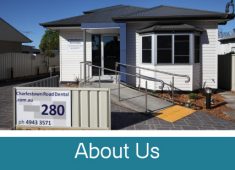Trauma to teeth and jaws can happen during sports, and even while sleeping!
Our mouthguards fit comfortably and provide protection
Sporting injuries make up a significant proportion of the reasons for tooth loss and damage. A well-fitting custom-made mouthguard provides a high level of protection against trauma to the teeth and the jaws, including the jaw joints, even providing a degree of protection against concussion. They do not interfere with talking and breathing through the mouth.
Our custom-made mouthguards are commonly used for contact sports such as:
- codes of football such as AFL or Rugby
- or martial arts
- boxing
However, a major proportion of dental injuries also occur playing supposed non-contact sports such as:
- netball
- basketball
- cricket
A mouthguard should be worn during practice as well as sporting events, as accidents don’t only happen during competition.
Occlusal Splints
An occlusal splint, somewhat similar in construction to a sporting mouthguard or orthodontic plate, is an appliance which can be used to protect the teeth from the forces on them from clenching and grinding the teeth (bruxism), primarily when sleeping.
Teeth grinding
At its simplest the grinding can wear down the teeth, first wearing through the glassy hard outer enamel, exposing the more wear-prone inner dentine which is then susceptible to continuing wear (attrition) not only from on-going grinding but also even chewing. More dramatically the forces on the teeth can encourage cracks in the teeth especially those which are weakened from cavities and subsequent fillings, causing a tooth to fracture partially or fully through.
While the bruxist forces on the teeth can also cause less obvious symptoms to the teeth such as sensitivity and even (otherwise unexplained) aches, the effects can be further wide-ranging causing disruption to the jaw joints (Temporo-Mandibular Joints, or TMJs) and muscles of the head and neck.
Occlusal splints can help alleviate TMJ symptoms
Clicking TMJs can be a symptom of this TMJ Dysfunction, although it can also occur without discomfort, and in the absence of grinding or other apparent traumatic cause. Muscles which are over-worked by intense and prolonged contraction can suffer cramp-like spasms which often can be felt as headache-like pain.
These effects can possibly all be alleviated in part or whole by use of an occlusal splint,
Other factors which can help in alleviating some physical discomfort in the the treatment of these problems are:
- managing stress (physical/emotional/psychological) as it can be a major contributor
- physiotherapy/exercise
- and at times medication
Snoring Appliances
A problem that will often seem unrelated to dentistry is snoring. Snoring may seem no more than an inconvenience (to the partner) but it can signal an underlying serious situation.
Obstructive Sleep Apnoea
Obstructive Sleep Apnoea (OSA) is a condition where the airway collapses (like a weak drinking straw when attempting to suck through it) causing periods of inability to inhale.
These periods of virtual choking cause sleep to be interrupted in order to resume breathing, sometimes every few minutes during the night. This may occur without waking up enough to remember it but enough to disrupt restful sleep, leaving the sufferer feeling tired despite enough sleep according to the clock.
Even worse is the great stress placed on the cardiovascular system which can have far-reaching negative health effects.
Following a sleep study to determine whether snoring is simply snoring, or more sinister OSA, there are various options to tackle the problem.
- lifestyle issues are important – losing weight, avoiding alcohol before retiring at night
- appliances can also be used to mechanically overcome the collapse of the airways.
A Continuous Positive Airways Pressure (CPAP) machine can be used to provide a gentle, continuous inflating effect of the airway (pushing the air in, rather than the lungs having to “suck” it in) by means of a small compressor and a nose or face mask.
Dental appliances can be used as an sleep apnoea treatment alternative to CPAP
An appliance that holds the lower jaw forward (Mandibular Advancement) uses the tension on the throat muscles to avoid collapse of the airway.
We typically use an MDSA appliance which is an upper and lower component that integrate to allow adjustable control over the degree of advancement of the jaw, while still allowing a degree of free movement of the jaw. These are most suitable for simple snoring and mild to moderate OSA, as an alternative to CPAP.
A comprehensive examination can provide insight into issues which may seem at first not to be dentally related such as headaches and snoring. Although the treatment may involve a dental solution, that may only be a part, requiring collaboration with other health professionals to tackle the issues from the most appropriate perspectives.











